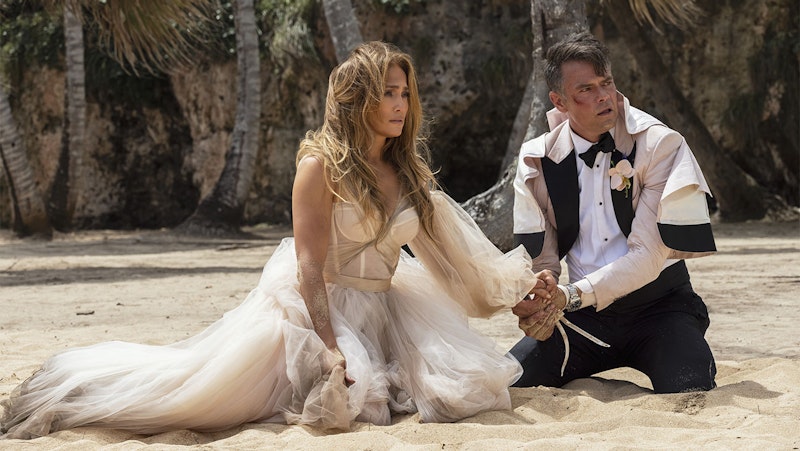The spark in the public relationship with the big screen romcom has dimmed. In a world of super-franchises, the small-scale love story has mostly been eclipsed by the sound of gargantuan explosions and lots of CGI. There are still a few exceptions; the combined star power of George Clooney and Julia Roberts made Ticket to Paradise a success last year, and Sandra Bullock’s The Lost City—an action movie stapled to a romcom—did good numbers as well. But for the most part, romcoms like Fire Island or the countless Hallmark-clone holiday movies make their home on small screen streaming, where the budgets and stakes are lower.
Jason Moore’s Shotgun Wedding was supposed to have a theatrical release, but that was scrapped when Amazon acquired it from Lionsgate last year. After a brief run in Asia for legal reasons, it’s now going to be released on Amazon Prime streaming. You can see its big screen ambitions—not least in the way that it spends the bulk of its runtime winkingly running away from its romance plot. It also makes the case, though, for the romcom’s continuing pleasures, even if they have to be scaled down.
The movie starts where most romcoms end: with the wedding. Darcy (Jennifer Lopez) wanted a small, non-traditional ceremony. But ex-minor league ballplayer Tom (Josh Duhamel) convinced her to participate in a giant blowout destination wedding in the Philippines. Things quickly go awry. Darcy’s dad, Robert (Cheech Marin), invites Darcy’s hot, wealthy ex, Sean (Lenny Kravitz), who arrives dramatically by helicopter without having sent in his RSVP. Tom’s mother, Carol (Jennifer Coolidge), barges in and prevents Darcy and Tom from having sex on the evening before the wedding because she thinks it’ll be bad luck. And pirates raid the ceremony and kidnap all the guests.
That last bit is actually a bit of good luck for the couple. Darcy is so frustrated with “groomzilla” Tom’s obsession with the perfect wedding—from the glowing pineapple centerpieces to the floofy white confection of a dress—that she almost breaks up with him. She doesn’t want to be a romantic spectacle, up there on the altar/screen for everyone to see. And so, on cue, the film grants her wish, and gives everyone (in the audience and on screen) something else to look at.
The “something else” is an action comedy—Die Hard on a Pacific Island. Darcy and Tom’s fight means that they’re not at the ceremony on time and are the only ones who are free and able to try to go for help and/or rescue everyone else.
It’s only in the lulls between the physical conflict that they can return to their marital dispute, worrying away at each other about Tom’s lack of self-esteem and Darcy’s fear of commitment. These story beats are pro-forma and unconvincing. Neither Lopez nor Duhamel has the comic timing or effortless charm of, say, Clooney or Roberts. Or Lenny Kravitz and Jennifer Coolidge, for that matter. When Darcy and Tom argue they sound like they’re whining. When they’re declaring their love, their chemistry is minimal. You can understand why the action movie keeps breaking in so everyone can watch that instead.
The smaller budget, with no CGI, is a big help—it’s a relief to see stunt people throwing each other around with no giant monsters or motion capture in sight. The first battle, in which, after confused negotiations, Darcy and Tom ambush a gunman with a net and hairspray is an early highpoint of physical comedy. The cramped fight in the kitchen, when Darcy faints every time she sees blood, is also as inventive as it is giggle-inducing. The choreography is aimed at entertaining and surprising you rather than at overwhelming you with force.
Franchises are supposed to be overwhelming; that’s why people want to see them on the big screen. Romcoms are a more intimate genre. They’re not meant to be perfect or awe-inspiring. That’s why Darcy is put off by Tom’s efforts to turn their wedding into a monument. Love is about being with each other and caring for each other. It’s not a spectacle.
Or is it? At least since Bringing Up Baby decided that a romance needed a couple of leopards running circles around it, romcoms have tried to come up with new ways to turn the feeling of intimacy into something broad enough to be visible from the cheap seats. The retreat to streaming has taken some of the urgency out of that contradiction, but it hasn’t made it disappear.
Shotgun Wedding isn’t a great movie or a great romcom. It’s full of good spirit, though. The script is cheerful and witty, and everyone seems to be having a good time—particularly in the end-credits dance scene, in which most of the actors are barely pretending to stay in character. If romcoms in general, and this romcom in particular, are no longer big enough for the theater, they can still be a reminder that sometimes movies are easier to love when they aren’t trying so hard to take over the world.

